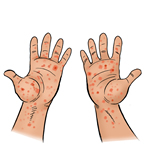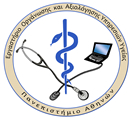Symptoms
1st week of illness
|
 1. High fever (39-40oC) that persists 1. High fever (39-40oC) that persists
|
|
|
|
 2. Abdominal pain 2. Abdominal pain
|
|
|
|
 3. Mental confusion 3. Mental confusion
|
|
|
|
 4. Constipation (in adults) or diarrhea (in children) 4. Constipation (in adults) or diarrhea (in children)
|
|
|
|
 5. Vomiting (commonly in children) 5. Vomiting (commonly in children)
|
|
|
|
 6.Dry cough 6.Dry cough
|
|
|
|
 7. Headache 7. Headache
|
|
|
|
 8. Loss of appetite 8. Loss of appetite
|
|
|
|
 9. Rash in the form of flat, rose-colored spots 9. Rash in the form of flat, rose-colored spots
|
|
|
|
 10. Weakness 10. Weakness
|
Transmission
As a rule, typhoid fever is transmitted via the fecal–oral route, i.e. through the consumption of food or water that has been contaminated by feces and urine of patients or carriers. A common contamination source are shellfish (in particular oysters) taken from sewage-contaminated waters, raw fruit, raw vegetables and contaminated milk or milk products.
Typhoid fever is spread through consumption of food or beverage handled by a carrier of the disease or through consumption of contaminated water.
Treatment
For the treatment of the disease seek medical advice. Typhoid fever is treated with antibiotics. It is important to continue the pharmaceutical treatment for as long as it was prescribed. In addition, rest, lots of fluids and regular meals are recommended.
Prevention
Τhe main precautionary measures are:
-
Avoid eating raw food or any not thoroughly cooked food and beverages
-
Get vaccinated against typhoid fever bacteria
-
Be careful in the selection of food and beverages consumed during travelling
General instructions for travellers include the following:
-
Drink bottled water or water that you have boiled for at least one minute
-
Ask for drinks without ice, unless the ice is made of boiled or bottled water
-
Eat foods that have been thoroughly cooked and are still hot
-
Avoid raw fruit and vegetables that cannot be peeled
-
Avoid food and beverages from street vendors
When to seek medical advice
If typhoid fever is suspected, call for medical help immediately. If the patient has vomiting that persists, severe diarrhea and distended abdomen, most probably hospital admission will be necessary.
Travellers to countries where typhoid fever is common (e.g. India, Pakistan, Banghladesh etc.) should ask their doctor regarding immunization.
Vaccines
There is a vaccine for typhoid fever, which is not entirely effective. The vaccine should be given at least one week before so as to be effective.
References
keelpno
nhs














